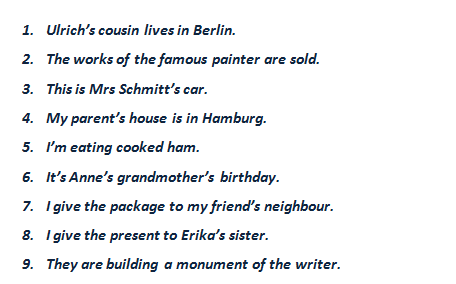Attributes (das Attribut)
The basic function of attributes are to accompany a word to explain it better. They can accompany different types of words.
fröhliches Gelächter (adjective with attribute use + noun)
gekochtes Fleisch (participle with attribute use + noun)
äußerst wichtig (adjective with attribute use + adjective)
dort hinten (adverb with attribute use)
a) Noun with attribute value
The attribute that accompanies a noun is usually a noun or a participle and it is usually placed in front of the noun.
| das schöne Haus (adjective) |
| der gekochte Fisch (participle) |
The noun can also be attribute of another noun. It is usually placed after the main noun and it goes in the same case as the noun.
Herr Müller, der Direktor der Fabrik
The noun can also go in attribute position in the genitive case, in fact the majority of nouns that accompany others go in the genitive case.
The attribute in genitive case is used to express belonging or property.
| das Haus meiner Eltern |
| die Gründung der Firma |
| die Romane der berühmten Schriftstellerin |
Although we decline the noun, the attribute stays in the genitive case.
| Nom.: Das ist die Frau meines Chefs. |
| Dat. : Ich gebe der Frau meines Chefs ein Geschenk. |
| Acc.: Ich grüße die Frau meines Chefs. |
Although the attribute in the genitive case is placed after the noun there are some exceptions; for example, when it accompanies names it is placed in front of them.
| Frau Schneiders Geschäft |
| Mrs Schneider's shop |
| - |
| Peters Schwester |
| Peter's sister |
| - |
| Ulrikes Arbeit |
| Ulrike's work |
---------------- oooo O oooo ----------------
Translate the following sentences.
(Click in the box to see the answers; double click to return to the original position)


